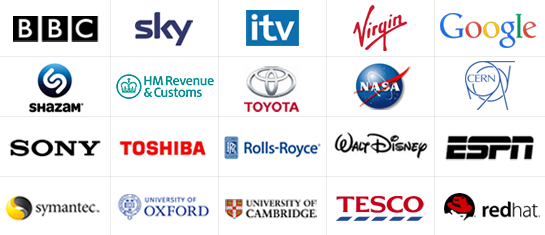 All orders Built, Shipped & Supported from within the European Union
All orders Built, Shipped & Supported from within the European Union

 All orders Built, Shipped & Supported from within the European Union
All orders Built, Shipped & Supported from within the European Union



FreeNAS is the simplest way to create a centralised and easily accessible place for your data. Use FreeNAS with ZFS to protect, store, backup, all of your data. FreeNAS is used everywhere, for the home, small business, and the enterprise.
2U, 12 Drive Bays, SAS / SATA Rackmount Storage Server
2U, 12 Drive Bays, SAS/SATA Rackmount Storage Server with 4x NVMe
2U, 24 Drive Bays, SAS / SATA Rackmount Storage Server
3U, 16 Drive Bays, SAS / SATA Rackmount Storage Server
4U, 24 Drive Bays, SAS / SATA Rackmount Storage Server
Ultra High-Density 4U, 72 Drive Bays, SAS / SATA Rackmount Storage Server
Large Capacity 4U, 36 Drive Bays, SAS / SATA Rackmount Storage Server
Ideal for HPC, Big Data & Analytics. 3x PCI-E 4.0 x16 expansion slots. Redundant power supply. 90 3.5"/2.5" Hot-swap SAS3/SATA3 drives, 2x Fixed slim SATA SSD, 2x NVMe M.2.
FreeNAS® supports the core features of a NAS appliance out of the box. However, many users like to enhance their NAS appliance with third party software for media streaming, alternative protocols, or web applications.
To make sure your NAS can do everything you want, FreeNAS offers a third-party plugin system based on the FreeBSD jails system and the PBI system from PC-BSD. The plugin system isolates third-party software from the core operating system but allows plugins access to user-specified directories and configuration from the main Web User Interface.
FreeNAS is a Free and Open Source Network Attached Storage (NAS) software appliance. This means that you can use FreeNAS to share data over file-based sharing protocols, including CIFS for Windows users, NFS for Unix-like operating systems, and AFP for Mac OS X users. FreeNAS uses the ZFS file system to store, manage, and protect data. ZFS provides advanced features like snapshots to keep old versions of files, incremental remote backups to keep your data safe on another device without huge file transfers, and intelligent compression, which reduces the size of files so quickly and efficiently that it actually helps transfers happen faster.
The benefit of using a NAS is that all your important files can be stored in a central location, allowing you to access them from multiple devices simultaneously, while also keeping your backup and redundancy resources in one place. FreeNAS lets you install programs for other purposes, such as bittorrent clients, media streaming servers, and cloud backup services, so it can fulfill many roles of a home server as well.
FreeNAS is based on the highly secure FreeBSD operating system and follows security best practices in development. However, FreeNAS is not designed as security software and it depends on being protected from hostile traffic by a properly configured firewall. FreeNAS supports 256-bit encryption to prevent drives from being read if they're physically removed from the system, but this doesn't protect against data being read in transit over the network or via compromised user credentials. Like all software, FreeNAS depends on good security practices to keep data safe.
File Sharing
File sharing is what FreeNAS does best. Every major operating system is supported with SMB/CIFS (Windows file shares), NFS (Unix file shares) and AFP (Apple File Shares) as well as FTP, iSCSI (block sharing), WebDAV and other methods of sharing data over the network are available. iSCSI also supports VMware VAAI, Microsoft ODX and Microsoft Windows Server 2008 and 2012 R2 Clustering.
Most operating systems, including Windows, Mac OS X, many Linux distributions, and PC-BSD can connect using SMB shares with little or no additional configuration needed on the client side. Most Unix-like operating systems support connecting with NFS out of the box, and free clients are widely available. AFP is primarily used by Mac OSX and is well suited for a network environment that only connects with Macintosh clients. FreeNAS also supports Time Machine backups.
Web Interface
If FreeNAS has one goal, it's simplifying complex administrative tasks for as wide a user base as possible. Every aspect of a FreeNAS system can be managed from a Web User Interface. A setup Wizard further simplifies configuration at installation time or later in the setup process. Volume creation, or the setting of permissions on individual shares or performing software updates, can be done without missing a critical step or encountering a silent failure.
Of course, the FreeNAS Team knows we can't think of everything. Many services have advanced configuration options available from the Web User Interface that is available in advanced menus. The full power of the FreeBSD shell environment is also available just a click away or through SSH. Ultimately, FreeNAS makes NAS deployment easier than ever but doesn't get between you and the solution you need.
Data Protection
ZFS is designed for data integrity from top to bottom. RAID-Z, the software RAID that is part of ZFS, offers single parity protection like RAID 5, but without the "write hole" vulnerability thanks to the copy-on-write architecture of ZFS. The additional levels RAID-Z2 and RAID-Z3 offer double and triple parity protection, respectively. A software mirror option is also available. The FreeNAS Volumes screen lists each possible parity arrangement based on the number of disks you select when creating a new volume.
Every ZFS filesystem is also verified with checksums from top to bottom to ensure data integrity. If inconsistencies are found, parity blocks can be used to repair corrupt data. A regular scrub is turned on by default and can be rescheduled or configured from the web interface.
Snapshots
Thanks to ZFS, snapshots of the entire filesystem can be made and saved at any time. As long as a snapshot exists, administrators can access files as they were when the snapshot was made.
Snapshots can be made on a one-off basis or scheduled as a cron job from the web interface. At any time, the entire filesystem can be rolled back to the most recent snapshot. Older snapshots can be cloned and accessed to recover data from that version of the filesystem. From the web interface, users can see how much space a particular snapshot is occupying on the volume and delete, clone, or roll back to individual snapshots as needed.
Replication
ZFS Snapshots are more than just local backups - they can be used to create remote backups as well. Replicating snapshots of the filesystem to a remote ZFS filesystem creates a complete duplicate there. Furthermore, additional snapshots of the same filesystem can be sent incrementally, reducing the size of each backup to the changes that were made between snapshots. In case of catastrophic damage to a local ZFS filesystem (such as disk failure in excess of parity protection or irrecoverable log device failure), any backed-up snapshot can be sent to a new ZFS filesystem, recovering all data up to that backup.
Encryption
FreeNAS is the first and only open source project to offer encryption on ZFS volumes! A full-volume encryption option is available during volume creation, providing industry standard AES-XTS encryption which can be hardware-accelerated (when the processor has AES-NI capability).
Encrypted volumes can only be read by FreeNAS systems in possession of the master key for that volume. The user can optionally create a passphrase to add extra protection for their system against loss or theft.
Encryption allows for confidence when retiring and recycling hard drives because the drives no longer need to be wiped provided the master keys are obliterated.
The Broadberry CyberStore range of enterprise-grade storage servers are designed and built for a wide-range of storage applications.
Completely customisable from processing to storage type and capacity, to operating system - the CyberStore range is your go-to storage platform.

The CyberStore range of storage servers are used by the world's largest organisations from the BBC, to the CERN project, governement institutions, universities and much more.
Year-after-year, the Broadberry CyberStore range of unified storage appliances has beaten the likes of Dell and HPE to be crowned "Best Storage Appliance" by PC Pro magazine.
When compared to the likes of DELL, HPE, EMC etc, the Broadberry CyberStore range of enterprise-grade unified storage appliances is up to 60% cheaper, although using the same quality components such as Seagate drives and Kingston RAM.
The Bradberry CyberStore range has been built from industry-leading commodity hardware, and carefully designed to ensuure full compatibility with leading storage operating systems and database engines.
Broadberry enterprise storage appliances are on average 86% lower cost than EMC and 55% lower cost than DELL although built using the same leading-brand server components such as Intel processors and Samsung memory. HPE hard drives are rebadged Toshiba enterprise-class drives, the exact same models as found in Broadberry storage appliances.
When you buy a Broadberry storage appliance all drive bays are supplied with caddies - so if in 6 months time you decide to expand the storage you can source it freely from the marketplace or ourselves if you wish. The only way to add hard drives to HPE servers is to buy the drives along with caddies from HPE for 200% the price of Broadberry's price.
Broadberry storage appliances come with enterprise-grade features like IPMI included, whereas HPE charge large fees for perpetual licences for the same features.
Our website allows you to configure your server online with accurate prices, as opposed to NetApp who require several face-to-face meetings with them before they'll give you a price.
Over recent years there's been a massive move from the world's largest organisations such as Google to purchase their servers from the likes of Broadberry rather than DELL and HPE. This move is fuelled by the rise in commodity hardware.


 Our Rigorous Testing
Our Rigorous TestingBefore leaving our UK workshop, all Broadberry server and storage solutions undergo a rigorous 48 hour testing procedure. This, along with the high-quality industry leading components ensures all of our server and storage solutions meet the strictest quality guidelines demanded from us.
 Un-Equaled Flexibility
Un-Equaled FlexibilityOur main objective is to offer great value, high-quality server and storage solutions, we understand that every company has different requirements and as such are able to offer un-equaled flexibility in designing custom server and storage solutions to meet our clients' needs.
We have established ourselves as one of the biggest storage providers in the UK, and since 1989 supplied our server and storage solutions to the world's biggest brands. Our customers include:
